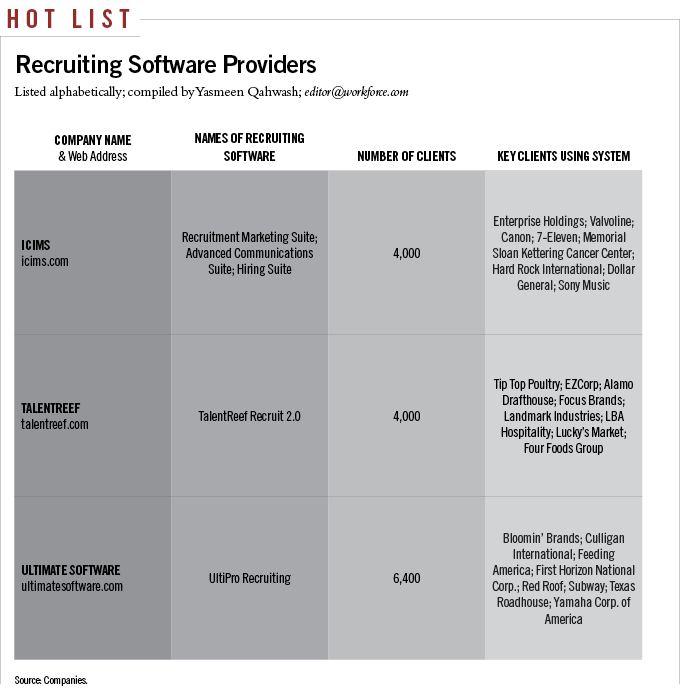Recruitment
The future of recruiting technology
By Sarah Fister Gale
Feb. 3, 2020
There are more open jobs than talent to fill them and companies are willing to try anything to win this war. That’s great news for recruiting technology firms that promise companies innovative solutions to find, engage and hire quality candidates.
Venture capitalists continue to court the recruiting tech sector, delivering yet another record-breaking year of investment. By the end of the third quarter of 2019, VCs had invested more than $4 billion in recruiting technology firms, and the industry was expected to cross $5 billion by the year’s end. Many of those investments went to recruiting platforms, including Jobvite, which received $200 million in February to acquire three new recruiting platforms for its portfolio; SmartRecruiter, which raised $50 million in May; and Fountain, a platform to hire gig and hourly workers that landed $23 million in October.
“The war for talent is not going away,” said Denise Moulton, vice president of HR and talent research at Bersin, Deloitte Consulting in Boston. However, companies are getting smarter about how they select and validate the impact of their recruiting technology.

“There are new solutions coming to market all the time,” she said. That is putting pressure on vendors to demonstrate value if they want clients to stick around.
Some companies need tools that will help them more effectively uncover passive candidates, figure out how to mine the former applicant pool and identify internal talent who might be perfect for a current opening. Others are more focused on automation tools to help them engage with candidates, conduct video recording or improve and track the candidate journey.
AI Is Finally Paying Off
Many of these tools now feature artificial intelligence to add to the value proposition. And that’s finally a good thing.
The industry has been talking about AI in recruiting for years, but the current generation of tools are actually making an impact, Moulton said. “AI is boosting productivity, helping to analyze candidate pools, and making it easier to keep track of people who you want to keep in your funnel,” she said.
The use of AI and automation is freeing recruiters to become advisers, focusing on building relationships and capturing data to track outcomes, said Jared Goralnick, group product manager for LinkedIn in San Francisco. “Analytics are helping them set realistic expectations about the size of the talent pool, and the ability to reach new talent.”
AI driven analytics are also reducing the time to fill key roles, and helping companies address diversity and inclusion goals. “These tools can be game changers,” Moulton said. Though as always they only work if you have the expertise to ask the right questions and enough data to generate meaningful unbiased analysis. “The more data you can feed (a system) the smarter it gets over time,” she said.
Skills Versus Experience
The other big trend in recruiting tech is the rising use of assessments, as companies look for ways to vet candidates’ skills and attitude, along with their qualifications and experience. “Assessments are critical if you want to build a funnel of candidates that will be relevant today and for the long term,” Moulton said.
Several vendors have acquired assessments companies, including SHL’s November purchase of Aspiring Minds, an AI-driven talent assessment and interviewing platform; Hired’s February acquisition of Py, an app that assesses candidates coding skills; and Mercer’s 2018 acquisition of Mettl, an India-based talent assessment firm.
And other firms are building their own assessments. Most notably, late last year LinkedIn launched its Skills Assessment feature, which lets users complete dozens of free skills assessments that they can add to their profiles. The early assessments focus primarily on technical skills, but the company plans to introduce soft skills and personality assessments over time.
“It will make it easier for candidates to highlight their skills, and for recruiters to filter their searches,” said Goralnick. It will also make the search process more relevant for candidates and companies. He noted that LinkedIn research shows 69 percent of professionals think their skills are more important than their college education, and 76 percent would like to be able to verify their skills as a way to stand out in a candidate pool. The assessments will help them do that, he said.
Moulton urged companies to be thoughtful about the technology they choose and to be sure it will add measurable value to the talent acquisition process.
“You can’t pick up every shiny new penny,” she said. “You have to figure out what your team will really use and how it will integrate into the workflow.”
Schedule, engage, and pay your staff in one system with Workforce.com.
Recommended
Compliance
Minimum Wage by State (2024)federal law, minimum wage, pay rates, state law, wage law compliance
Staffing Management
4 proven steps for tackling employee absenteeismabsence management, Employee scheduling software, predictive scheduling, shift bid, shift swapping
Time and Attendance
8 proven ways to reduce overtime & labor costs (2023)labor costs, overtime, scheduling, time tracking, work hours
